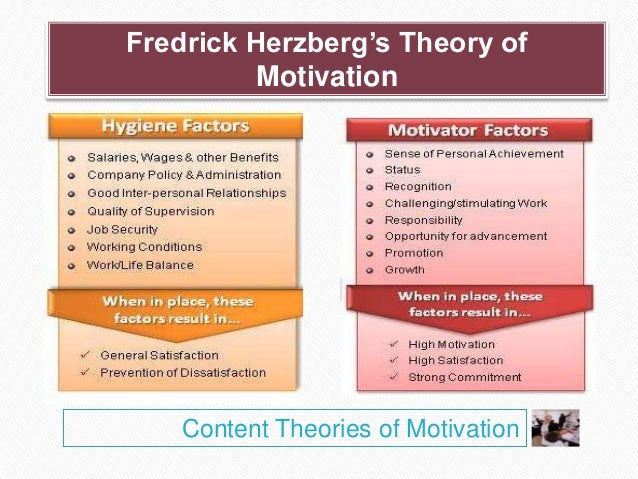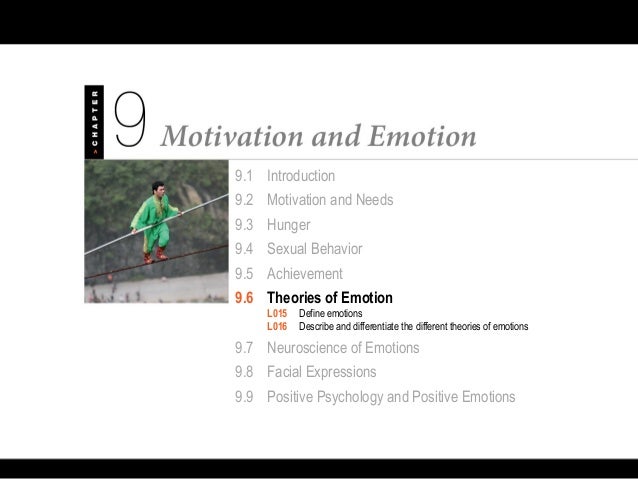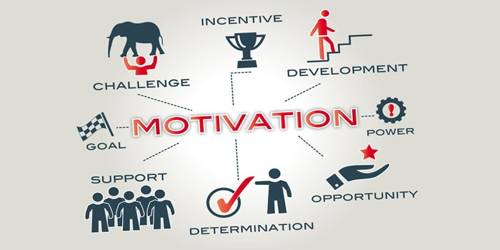Different Theories Of Motivation
Theories of Motivation - Overview of the Content Theories

Return to Content. Motivation Theories Top 8 Theories of Motivation - Explained Some of the most important theories of motivation are as follows 1. Maslow s Need Hierarchy Theory 2. Herzberg s Motivation Hygiene Theory 3. McClelland s Need Theory 4. McGregor s Participation14. Fredrick Herzberg s Theory of Motivation Content Theories of Motivation Job satisfaction and Job dissatisfaction are important concepts of Herzberg s motivation - hygiene theory. School administrators may neglect to consider that dissatisfied teachers may weaken the educational program.Theories of motivation are often separated into content theories and process theories. Maslow s theory of the hierarchy of needs Alderfer s ERG theory McClelland s achievement motivation theory and Herzberg s two-factor theory focused on what motivates people and addressed specificContent Theories vs. Process Theories. As we ve already discussed there are many different theories of motivation in existence and each of Let s now give a brief overview of each of these theories of motivation. If you d like to dig deeper then we have provided links to an article coveringContent theory is a subset of motivational theories that try to define what motivates people. Content theories of motivation often describe a system of needs that motivate peoples actions. While process theories of motivation attempt to explain how and why our motivations affect ourSeveral theorists have given theories regarding factors behind motivation. These theories primarily fall into two categories. They are the process theories It would be useful for managers to understand the sources of motivation for each individual employee. The basis of the content theories is thatThese motivational theories provide insights into the way people behave and what motivates them. Motivation is a huge field of study. Psychologists have proposed many different theories of motivation. Some of the most famous motivational theories include the following 1. Maslow sMotivation theories are used to understand explain and influence human behavior. The following theories are considered contemporary or modern not only because they necessarily were developed recently but because they represent the current state of the art in explaining employee motivation.The content theories deal with what motivates people whereas the process theories deal with How motivation occurs. Thus theories of motivation can be broadly classified as Content Theories The content theories find the answer to what motivates an individual and is concernedProcess theories The process theories on the other hand explore how behavior is caused sustained or stopped by the motivational factors. The type of motivation by which each individual is driven derives from their life experiences and the opinions of their culture. This need theory is often taught in
Describe a content theory of motivation. The theories presented in this section focus on the importance of human needs. Any discussion of needs that motivate performance would be incomplete without considering Abraham Maslow.8 Thousands of managers in the 1960s wereContemporary theories of motivation incorporate equity control and agency theory as well as goal setting reinforcement and job design theory. Poor customer service will be the order of the day among employees which will end up tarnishing the name of the business. A company is bound toMotivation Hygiene theory and Victor Vroom s Expectancy theory. Although more valid. explanations of motivation have been developed these early motivational theories in practical scenario. And successful implementation of the theory will. definitely ensure positive minded employees and whichSkip to content. The theories of motivation identify individual needs their expectation and reaction to both internal as well as to the external environment. A ground-breaking theory on the subject of motivation and needs of the human being was advanced by Abraham Maslow in 1954.Motivation theories aim to explain the forces behind our actions and behavior. Medical Reviewers confirm the content is thorough and accurate reflecting the latest evidence-based research. According to the drive theory of motivation people are motivated to take certain actions in order toThe PRIME Theory of Motivation provides a framework in which more specific theories of choice self-control habits emotions and drives are combined Social media interventions may be designed to address the subsystems of the human motivational system as well as facilitate the process ofTheories of Motivation Regarding Behaviour There are basically two types of theories developed that relate to and define the motivational processes. These are the content theories which attempt to determine and specify drives and needs that motivate people to work and process theories whichMotivational Theories in Organizational Behaviour. Prices Theories of Motivation. These factors are related to the content of the job. They are inherent in the job and operate primarily to build motivation. Their existence will yield feelings of satisfaction but their absence will not create strongMotivation Direction and Intensity. Content Theories of Motivation. Organizational Behavior. Work Motivation for Performance. Process Theories of Motivation. Operant conditioning theory is the simplest of the motivation theories. It basically states that people will do those things for which theyTheory Z- Ouchi. Table of Contents. Theories of Motivation. 1. Content or Need Theories Need for affiliation This need is similar to the social needs of the hierarchy theory. People with high needs for affiliation join business houses where they can form social groups healthy environment and also
Several theories attempt to explain how motivation works. In management circles probably the most popular explanations of motivation are based on the needs of the individual. The basic needs model referred to as content theory of motivation highlights the specific factors that motivate an individual.Two content theories of motivation Maslow s hierarchy needs Physiological Needs These include the most basic needs that are vital to survival such as Compare and contrast one process theory of motivation with one content theory. Include in your answer a brief explanation why one is a processAssessment Biopsychology Comparative Cognitive Developmental Language Individual differences Personality Philosophy Social Methods Statistics Clinical Educational Industrial Professional items World psychology .Classical Theories of Motivation. The motivation concepts were mainly developed around 1950 s. These theories are building blocks of the contemporary theories developed later. MSG Content Team comprises experienced Faculty Member Professionals and Subject Matter Experts.McGregor s Theory X Theory Y Model is another of the key contributors to motivation theories. His theory states that there are two ways of managing and motivating individuals. In tandem with the motivational guidelines there are common factors to avoid when trying to inspire and motivate people.Motivation Theories Motivation is one of the key factors driving us towards achieving something. According to this theory people are motivated by the greed for power achievement and affiliation. By offering empowerment titles and other related tokens people can be motivated for doing their work.Theories of Motivation - Overview of the Content Theories of Motivation Presentation Transcript 1. Yenna Monica D. P. 2. What is MOTIVATION Derived from the Latin word MOVERE which means to move The processes that account for an individual s intensity directionAccording to needs theories of motivation motivation is the willingness to exert high levels of effort toward organizational goals conditioned by the Here is an overview of the different needs theories we ve seen so far. They show the similarities and differences between the workplace motivationThe content theories of motivation are based in large part on early theories of motivation that traced the paths of action backward to their The implication for managers of the motivator-hygiene theory is that meeting employees lower-level needs by improving pay benefits safety and otherThe cognitive theories of motivation include the Expectancy Theory and the Goal-Setting Theory. The Expectancy Theory of Motivation explains why and how an individual chooses one The theory states that there are three factors that influence the expectancy perception of a person which include
Theories of Motivation - RBI Guru

Psychology 101 Chapter 9 Motivation and Emotion

Chapter 4 Leadership - Kyle Shulfer - Leadership
Techniques of Motivation - Assignment Point

Motivating Students to Learn - Strategies and Insights

Adams Equity Theory a powerful theory of motivation

School of Business. Motivation -